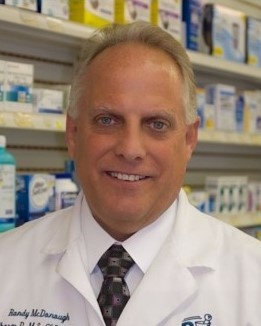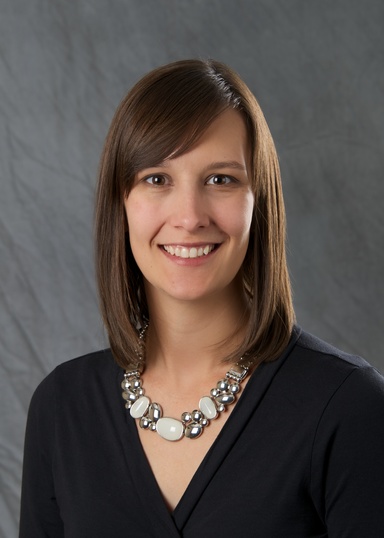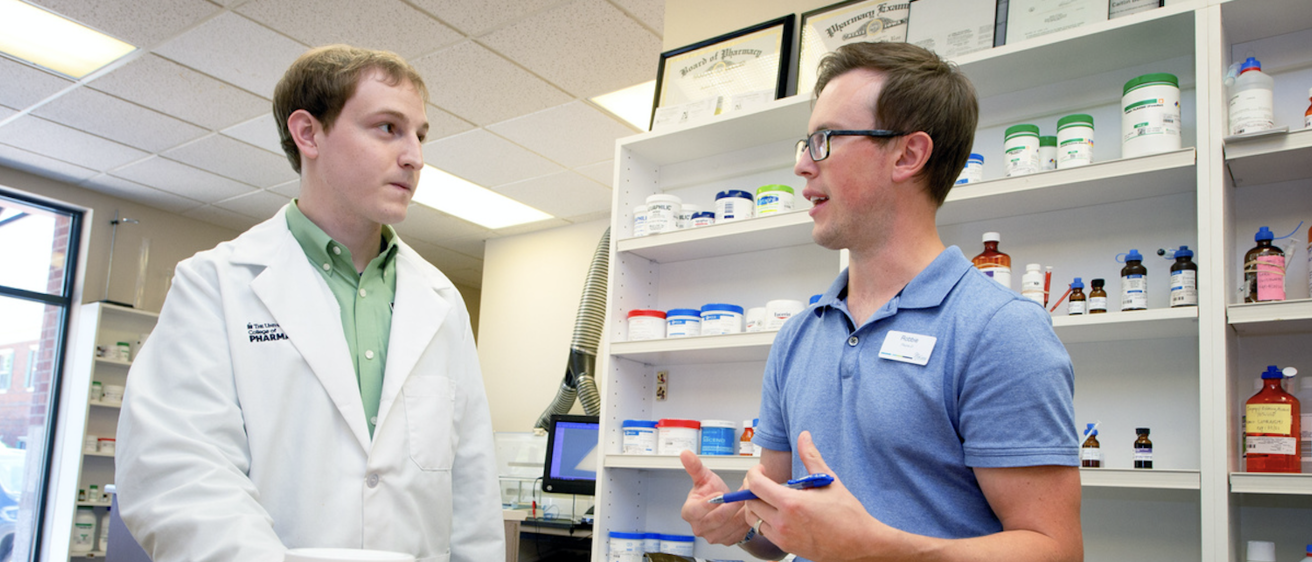Across the state and nation, community pharmacists are working together to transform the way they practice. University of Iowa College of Pharmacy faculty and alumni are supporting the effort.
Pharmacists are medication experts, yet traditionally those in community pharmacy settings have been paid based primarily on how many prescription medicines they can tally up and dispense in a day. However, they can and are often driven to do much more. Despite that, community pharmacists are rarely compensated for their clinical expertise. Also, payments based on dispensing are shrinking; sometimes pharmacies actually pay more for a drug than they can sell it for.

Director of Practice Transformation
Flip the Pharmacy
You cannot make it based on dispensing by itself anymore.
“Pharmacies that don’t provide value-based services are not going to survive, because you cannot make it based on dispensing by itself anymore,” Randy McDonough told a group of student pharmacists at the UI College of Pharmacy this fall. McDonough, ’87 BSPh, ’00 PharmD, co-owns Towncrest Pharmacy (Iowa City) and Solon Towncrest. He is also the director of practice transformation for a national effort to lift up the profession of community pharmacy, called Flip the Pharmacy.
Flip the Pharmacy is led by a national network of community pharmacists, CPESN USA, which stands for the Community Pharmacy Enhanced Services Network. The group has banded together to demonstrate that they can save money for health plans while being paid to be more strategic about improving patient health over time.
“The goal of this network of community pharmacies is to try to get contracts from insurers that are fair and inclusive,” said William Doucette, PhD, a division head and professor in the University of Iowa College of Pharmacy who will help assess the pharmacies’ progress.
Last fall, CPESN Iowa was selected as one of 20 transformation teams nationwide to receive grant money from the Community Pharmacy Foundation funded Flip the Pharmacy grant. The purpose of the grant is transforming pharmacy practice. Thirty CPESN Iowa network pharmacies are among the first two-year cohort to implement this program, which will last five years. The pharmacies are supporting each other as they continue to move toward new and higher quality, scalable ways to offer so-called “enhanced” services.
The grant helps participating pharmacies improve processes and business models in six main ways:
Helping them find time for more appointments with patients, monitoring and following up with patients, freeing up the pharmacists’ time by utilizing technicians in new ways, optimizing technology for managing patient care, integrating more with other health care providers, and demonstrating their worth.
The enhanced services the pharmacies are implementing range from strategizing how to better manage blood pressure and diabetes in community members; to synchronizing a patient’s medications to a single “pick-up” date every month or every three months; to establishing an appointment to meet with a pharmacist on this date; and many other enhanced services.
McDonough stressed that community pharmacists have been offering enhanced services for years, but some may be further along or more knowledgeable about a certain service. “Innovations happen in pockets around this country, and every week I meet with and talk to subject matter experts. Flip the Pharmacy trainers learn from and pass along their expertise,” he said. “We're not creating new innovation. We're taking innovation and we're scaling it.”
On the ground, pharmacy participants are enthusiastic about what they’re learning.

College of Pharmacy Faculty Member
Coach, Flip the Pharmacy
Alumni pharmacists at the sites involved in this project are transforming their practices to provide amazing patient care and they are dedicating time and resources to make this project succeed.
“Alumni pharmacists at the sites involved in this project are transforming their practices to provide amazing patient care and they are dedicating time and resources to make this project succeed,” said Stevie Veach, ’06 PharmD, '07 R. As a pharmacy practice transformation coach for Flip the Pharmacy, Veach oversees the progress of four pharmacies that are expanding or improving their pharmacy services.
“As a transformation coach, I hold the pharmacies accountable for implementing the monthly Flip the Pharmacy goals, but I also serve as a resource to answer questions, provide examples, or sometimes just to be a sounding board to bounce ideas off of.”
Veach is a clinical assistant professor and director of the PGY1 Community-based Pharmacy Program at the college, and is also a practicing community pharmacist at MercyOne Pharmacy in Dubuque. “We have faculty and many alumni involved in this project on many levels,” she added.
The UI College of Pharmacy is one of a small number of groups who have committed at least $50,000 in in-kind donations to the state’s Flip the Pharmacy practice transformation teams.
Specifically, six faculty members will spend 5-10 percent of their work hours on the project.
They are:
- Jay Currie (education and coaching)
- William Doucette (research)
- Mike Kelly (education and coaching)
- Laura Knockel (education)
- Stevie Veach (practice transformation coach), and
- Matt Witry (research)
Towncrest Pharmacy earlier took part in a pilot program of enhanced services through Wellmark, which later opened a new program for 74 Iowa pharmacies.
“From the perspective of a healthcare insurer, the idea is they should not mind paying on top of what they are already paying for dispensing. Because they recognize that this set of pharmacists are helping their patients take their medications right. That means they’re going to stay out of the doctor’s office and the ER,” said Doucette.
“These things save them money.”
